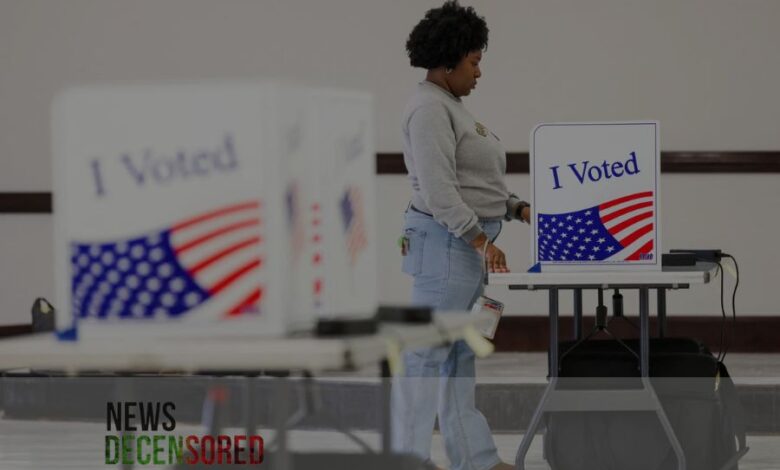What is Super Tuesday and why is it important? All you need to know.

One of the busiest days of the United States election calendar is
here.
Super Tuesday takes place on March 5 which is today, millions of voters expected to cast ballots in presidential primaries and caucuses in more than a dozen states. Both chambers of the US Congress – the House of Representatives and the Senate – will be on the ballot, as well as other contests.
President Joe Biden faces little opposition from the Democratic Party and is guaranteed to be confirmed as the party’s nominee. In the race for the Republican presidential nomination, however, Super Tuesday could be the end for former UN ambassador Nikki Haley. She is the last major candidate still challenging former President Donald Trump, the front-runner, but her campaign has failed to loosen Trump’s iron grip on the party.
What is Super Tuesday?
Super Tuesday is the day when the largest number of states hold their presidential primaries and caucuses.
These state-level races help candidates from the two major political groups – Democrats and Republicans – get the nod they need to win their party’s endorsement. Delegates ultimately represent their states at party conventions, where they vote for a nominee based on
the results of the primaries and caucuses.
Which US states are voting on Super Tuesday?
Fifteen US states are voting on Super Tuesday:
- Alabama
- Alaska
- Arkansas
- California
- Colorado
- Main
- Massachusetts
- Minnesota
- North Carolina
- Oklahoma
- Tennessee
- Texas
- Utah
- Vermont
- Virginia
Voting will also take place in the territory of American Samoa.
Results of the Democratic caucuses in Iowa are also expected on March 5.
Where does the phrase “Super Tuesday” come from?
Most experts agree that, “Super Tuesday was born, more or less as we know it today”, in 1988.
That’s when a group of Democrats in South American states decided to “front-load” the presidential primary process after Republican President Ronald Reagan defeated Democratic White House hopeful Walter Mondale four years earlier.
Their thinking was that by casting their ballots on a single day early in the election cycle, they could better influence their party’s choice – and ensure that the eventual nominee won the American South. The
1988 effort was unsuccessful, but Super Tuesday is the day most US states hold their votes.
Why does Super Tuesday matter?
Super Tuesday matters because about one-third of the delegates will be allocated by each party to decide their respective presidential nominees.
A strong showing could effectively give a presidential campaign a shot in the arm, helping White House hopefuls gain more financial support and build momentum. But a poor result can also halt the campaign.
What to expect in this year’s presidential primaries?
For Haley, a former ambassador to the United Nations, a poor performance could be the end of her campaign for the 2024 Republican nomination. Polls show Trump trailing in all Republican contests heading into Super Tuesday.
Haley – who has so far lost to Trump by wide margins in all primary state contests – said she planned to stay in the race at least through Super Tuesday. Her plans beyond that are unclear.
“I’m not giving up this fight when the majority of Americans dislike both Donald Trump and Joe Biden,” she said after losing the Feb. 24 primary in her home state of South Carolina.
Will there be more voting than the presidential primary race?
Yes. Americans will also vote on Super Tuesday in several so-called “down ballot” races.
These include contests to fill seats in the Senate and House of Representatives as well as state legislatures.
There will also be races for lower-level positions such as prosecutors, judges, city councilors and school board members.
What are some Super Tuesday races to watch?
One of the most anticipated contests is taking place in California. Voters there will choose two candidates in November to fill the vacant Senate seat held for decades by Dianne Feinstein, who died in September.
A recent poll showed Democratic Congressman Adam Schiff leading with 28 percent support in the primary race, which is open to candidates from either party. Republican and former baseball player
Steve Garvey had 22 percent, while Democratic Reps. Katie Porter and Barbara Lee received 16 and 9 percent, respectively.
In Texas, a number of Democratic candidates are vying to challenge Republican Ted Cruz for his Senate seat. A poll released by the University of Houston in early February showed Congressman Colin
Allred with 40 percent of Democratic primary voters, compared to 12 percent for his nearest rival, Texas State Senator Roland Gutierrez.
“But whether it’s Allred or Gutierrez in the general election against Ted Cruz, Cruz will be a very strong favorite,” Rice University political scientist Mark Jones, who co-authored the report, said in a statement.
Here are some other races to watch:
- In Minnesota, Muslim community leaders are urging voters to vote “non-binding” on their Democratic primary ballots in protest of Biden’s support for Israel during the Gaza war. A similar campaign in Michigan has 27 received more than 101,000 votes in February.
- In North Carolina, Democrats and Republicans are holding primaries to choose their respective candidates for governor. Far-right Lt. Gov. Mark Robinson leads and has Trump’s support, while state Attorney General Josh Stein leads polls for Democrats.
- In Alabama, a number of candidates are vying to represent a new congressional district. Created after the US Supreme Court approved new electoral maps, the 2nd District has moved from a Republican stronghold to an area where Democrats have a chance, local media reported.
When will we get the Super Tuesday results?
The results will start coming out as soon as the polling ends in each state and territory. Usually, this happens around or after 7pm local time.




